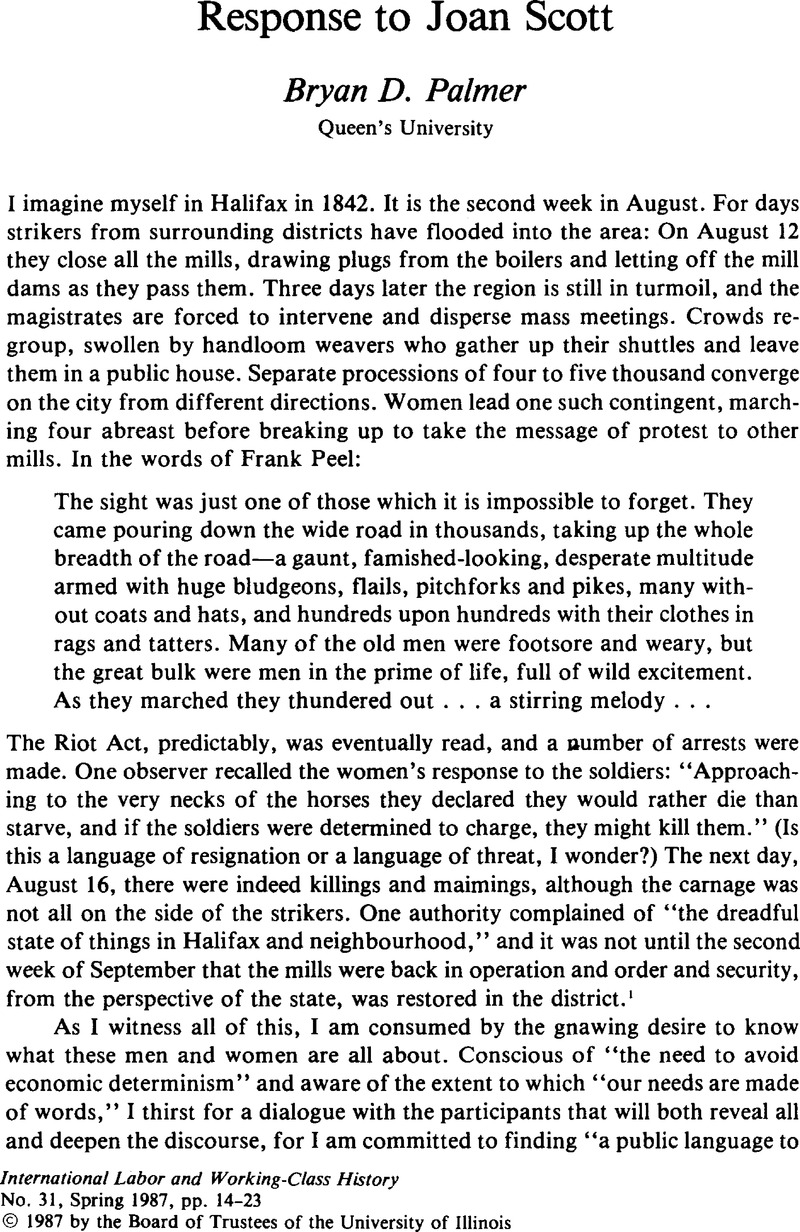Published online by Cambridge University Press: 16 December 2008

1. See Thompson, Dorothy, The Chartists: Popular Politics in the Industrial Revolution (New York, 1984), 292–95.Google Scholar
2. These quoted phrases are drawn from Jones, Gareth Stedman, “Introduction,” Languages of Class: Studies in English Working Class History, 1832–1982 (Cambridge, 1983), 13Google Scholar; and Ignatieff, Michael, The Needs of Strangers: An Essay on Privacy, Solidarity, and the Politics of Being Human (New York, 1985), 142Google Scholar, texts that I take to be related to one another.
3. Note, for instance, Behagg, Clive, “An Alliance with the Middle Class: The Birmingham Political Union and Early Chartism,” in The Chartist Experience: Studies in Working-Class Radicalism and Culture, 1830–1860, ed. Epstein, James and Thompson, Dorothy (London, 1982), 59–86CrossRefGoogle Scholar; Calhoun, Craig, The Question of Class Struggle (Chicago, 1982)Google Scholar; Palmer, Bryan D., A Culture in Conflict: Skilled Workers and Industrial Capitalism in Hamilton Ontario, 1860–1914 (Montreal, 1979), 97–123Google Scholar; Kealy, Gregory S., Toronto Workers Respond to Industrial Capitalism, 1860–1892 (Toronto, 1980), 3–17.Google Scholar
4. Foster, John, “The Declassing of Language,” New Left Review 150 (03–04 1985):40.Google Scholar
5. Jones, Stedman, “Introduction,” 12, 19–20Google Scholar. CfJones, Stedman, “History: The Poverty of Empiricism,” in Ideology and Social Science: Readings in Critical Theory, ed. Blackburn, Robin (New York, 1973), 96–115.Google Scholar
6. See, for instance, Epstein, and Thompson, , eds., The Chartist Experience.Google Scholar
7. See Epstein, James, “Rethinking the Categories of Working-Class History,” forthcoming, Labour/Le Travail (1987).Google Scholar
8. The quotation is from Thompson, , The Chartists, 238–39Google Scholar For examples of how historians have interrogated the language of sources, note Thompson's, E. P. comments on informers in The Making of the English Working Class (Harmondsworth, 1968), esp. 529–40Google Scholar; or Friedlander's, Peter unique oral history of the organization of a UAW plant in Michigan in The Emergence of a UAW Local, 1936–1939: A Study in Class and Culture (Pittsburgh, 1975).Google Scholar
9. See Briggs, Asa, “The Language of Class in Early Nineteenth-Century England,” in The Collected Essays of Asa Briggs, vol. 1, Words, Numbers, Places, People (Urbana, 1985), 3–33Google Scholar; Epstein, “Rethinking.” The notion of a class struggle within language was first elaborated in the Soviet Union by Volosinov, but his views fell out of official favor.
10. Foster, , “The Declassing of Language,” 41. Thisunity of the political and the economic is fundamental to Thompson's, Making.Google Scholar
11. See Samuel, Raphael, “The Workshop of the World: Steam Power and Hand Technology in mid-Victorian Britain,” History Workshop Journal 3 (Spring 1977): 6–72.CrossRefGoogle Scholar
12. Such a perspective raises questions about the extent to which the working class was “made” before Chartism. See Hobsbawm, E. J., “The Making of the Working Class, 1870–1914,” in Workers: Worlds of Labor (New York, 1984), 194–213.Google Scholar
13. Jones, Stedman, “Rethinking Chartism,” 144.Google Scholar
14. Thompson, E. P., The Poverty of Theory and Other Essays (London, 1978), 235–36, for example.Google Scholar
15. The above paragraph draws on Foster, “The Declassing of Language,” esp. 37–41; Foster, , “Linguistics,” in A Dictionary of Marxist Thought, ed. Bottimore, Tom (Cambridge, 1983), 281–83Google Scholar; Bekerman, Gerard, Marx and Engels: A Conceptual Concordance (Oxford, 1983), 93Google Scholar; Marx, , Grundrisse (Harmondsworth, 1973), 490Google Scholar; Williams, Raymond, “Base and Superstructure in Marxist Cultural Analysis,” in Problems in Materialism and Culture (London, 1980), 31–49.Google Scholar
16. Note, for instance, Delany, Sheila, “Confessions of an Ex-Handkerchief Head, Or Why This Is Not a Feminist Book,” in Writing Woman: Women Writers and Women in Literature, Medieval to Modern (New York, 1983), 1–22.Google Scholar
17. London Female Democratic Association, quoted in Thompson, Dorothy, The Chartists, 120Google Scholar. For a similar statement from a Canadian woman Knight of Labor in the context of the demand for universal male suffrage in the 1880s see Kealey, Gregory S. and Palmer, Bryan D., Dreaming of What Might Be: The Knights of Labor in Ontario, 1880–1900 (Cambridge, 1982), 321.Google Scholar
18. This is a position asserted by Taylor, Barbara, Eve and the New Jerusalem: Socialism and Feminism in the Nineteenth Century (London, 1983)Google Scholar, but not demonstrated empirically. It is accepted by Scott, but note, for dissident views: Wier, Angela and Wilson, Elizabeth, “The British Women's Movement,” New Left Review 148 (11–12 1984):85–88Google Scholar; Montgomery, David, “Response to Harold Benenson, ‘Victorian Sexual Ideology and Marx's Theory of the Working Class,’” International Labor and Working Class History 25 (Spring 1984): 24–29.CrossRefGoogle Scholar
19. See, for instance, Burstyn, Varda, “Economy, Sexuality, and Politics: Engels and the Sexual Division of Labour,” Social Studies/Etudes Socialistes (Winnipeg, 1983): 19–39.Google Scholar
20. Seccombe, Consider Wally, “Marxism and Demography,” New Left Review 137 (01–02 1983): 22–47.Google Scholar